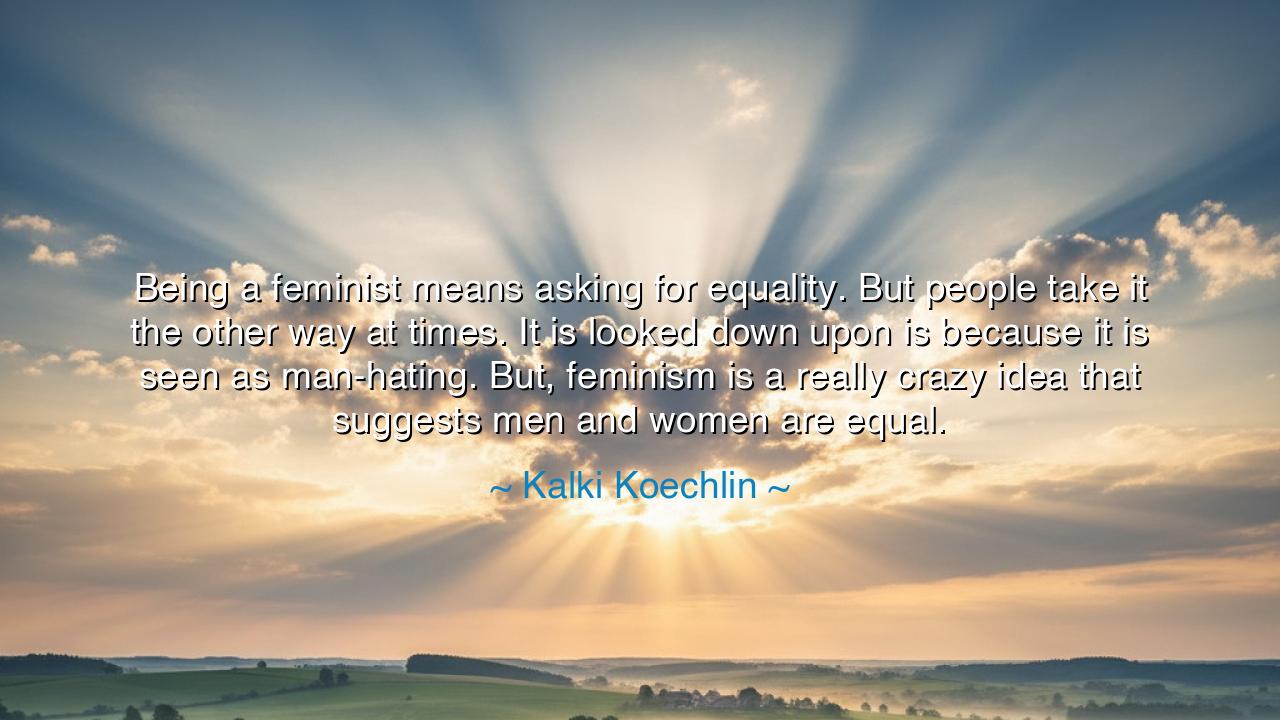
Being a feminist means asking for equality. But people take it
Being a feminist means asking for equality. But people take it the other way at times. It is looked down upon is because it is seen as man-hating. But, feminism is a really crazy idea that suggests men and women are equal.






Hear now, O children of wisdom, for the words I speak echo the deep truth that has been both whispered and shouted throughout the ages: "Being a feminist means asking for equality. But people take it the other way at times. It is looked down upon because it is seen as man-hating. But, feminism is a really crazy idea that suggests men and women are equal." These words, spoken by Kalki Koechlin, challenge the very essence of how we perceive gender, equality, and justice. They remind us that feminism, at its core, is not a battle against men, but a call for the recognition of equal dignity and rights for both men and women.
In the ancient world, children, the idea of equality was often reserved for the powerful—those who were born into noble families, those who wielded swords or scepters, those who sat on thrones. The common people, women, and slaves were relegated to the shadows, their worth often ignored or dismissed. The very concept of equality between men and women would have seemed radical, even impossible, in a time when women were often seen as property, as lesser beings, or as mere vessels for bearing children. But even in the face of such oppression, there arose voices—voices like those of the philosophers, the rebels, and the visionaries—who spoke of justice, dignity, and the shared humanity of all people.
Consider the story of Socrates, who, though he lived in a time when women had little voice in the affairs of the world, acknowledged that every human being—regardless of their gender—deserved to think, question, and reason. His student Plato, too, recognized that women, though often excluded from formal education and politics, had the capacity for wisdom and leadership. Though these ideas were not fully embraced in their time, they laid the foundation for the eventual rise of the feminist movement. The battle for equality has always been one fought not just by women, but by those who saw the inherent worth of every soul, regardless of gender.
Now, Kalki Koechlin speaks to us of the misconception that feminism is a man-hating ideology, a belief that has been wrongly cast upon the movement by those who seek to discredit its true message. She reminds us that feminism is not about rejecting men, but about embracing equality—about recognizing that men and women are not so different that one must dominate the other. To seek equality is not to attack the other, but to demand the same rights, the same opportunities, and the same respect for all. It is a radical idea, yes, because it suggests that the power structures that have long oppressed women—whether in politics, work, or family—must be torn down in favor of a world where both men and women stand as equals, side by side.
The feminist movement, children, is not just a call for women’s rights. It is a call for justice for all people. It is the same cry for freedom that was heard in the struggles for civil rights, for the rights of the poor, for the rights of the oppressed. Feminism is the belief that equality should be the natural state of human society, and that gender should never determine the value, the voice, or the dignity of a person. It is not an attack on men, but a call for all people to see each other as equals, to share in the gifts and opportunities that life offers, and to build a world where everyone is given the chance to flourish.
Consider the story of Emmeline Pankhurst, the British suffragette who fought tirelessly for the right of women to vote. Her struggle was met with great resistance, and yet she stood firm, even in the face of imprisonment and suffering. She was not against men; she was for justice, for the right of all people to have a say in the laws that governed them. Pankhurst’s fight for women’s suffrage was a battle not just for women’s rights, but for the very soul of democracy. She understood that when one group of people is denied equality, all people suffer. Her victory did not come because of a hatred of men, but because of a belief in the shared human dignity of all people.
The lesson here, children, is clear: feminism is not a battle against men, but a fight for the inherent equality of all people. It is a radical belief in the dignity of every soul, a call to tear down the walls that divide us and to build a world where all people—men and women alike—are seen and treated as equals. We must not be afraid of the term feminism, nor should we allow it to be mischaracterized as a force of division. Instead, let us embrace it as a call to justice, as a fight for the equality that lies at the heart of all human struggles.
So, children, I urge you: take up the banner of equality, and walk boldly in the footsteps of those who have fought before you. Feminism is not a path of anger, but a path of hope—hope for a future where all people, regardless of their gender, are free to live with dignity and respect. Do not be swayed by those who seek to distort its message. Speak out for justice, and work for a world where all people—men and women alike—are valued for their intrinsic worth and their shared humanity.






AAdministratorAdministrator
Welcome, honored guests. Please leave a comment, we will respond soon